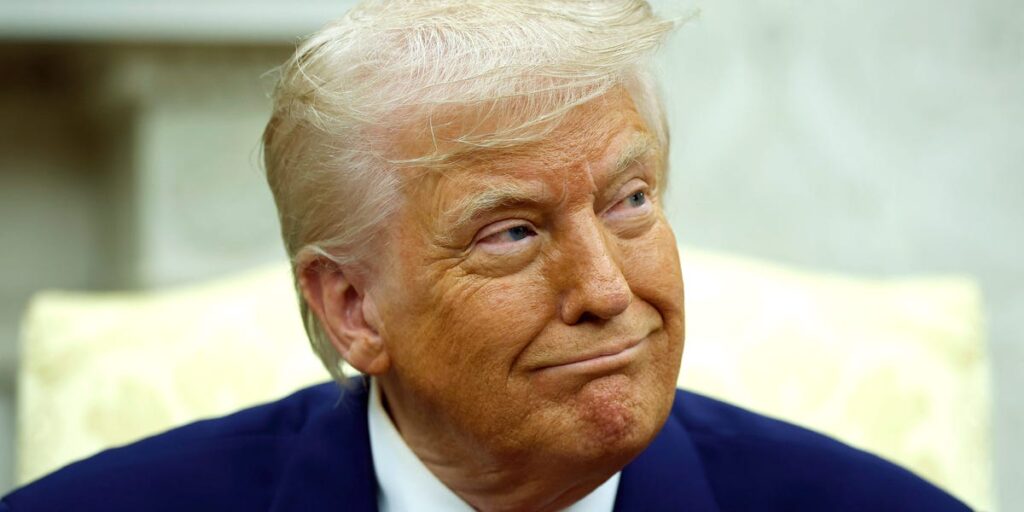President Donald Trump’s 90-day pause on sweeping tariffs was felt worldwide and in the financial markets, with some stakeholders making out better than others.
On Wednesday afternoon, Trump abruptly paused the tariffs, which took effect after midnight early Wednesday morning. Before his rollback, stocks cratered for days amid the volatility brought on by the tariffs.
The reversal quickly sent stocks skyward. The S&P 500 had its biggest single-day gain since 2008 at 9%, while the Dow rose nearly 3,000 points and the Nasdaq surged 12%.
Some business leaders reacted with relief to the move, but not everyone was unscathed. China was hit with even greater tariffs, which Trump said were due to the retaliatory tariffs the country enacted on the US.
Here’s who was sitting a bit prettier at market close on Wednesday and who could be worse off.
Winners
Airlines and other travel companies
Travel companies saw some of the biggest market gains on Wednesday, with United Airlines’ share price surging 26% and Delta Air Lines’ stock rising 23%. Cruise companies did well, too, with Norwegian Cruise Line Holdings up 19% and Carnival Corp up 18%. Expedia Group was also up 18% on the day.
“It wasn’t just the airlines. All travel brands really were the winners today on Wall Street,” Amir Eylon, president and CEO of Longwoods International, a travel tourism market research consultancy, told BI.
Eylon said two main issues travel companies faced with the tariffs were increased supplier costs on things like aircraft parts, hotel supplies, and building materials, as well as a fear that increased prices across the economy could weaken travel spending.
Semiconductor companies
Intel, Nvidia, and several other semiconductor companies were among the biggest winners regarding share price increases. Both Intel’s and Nvidia’s share prices rose by around 18%.
Even though semiconductors, or chips, were exempt from tariffs, BI’s Emma Cosgrove reported earlier this week that other components used in products that chips are used in could’ve been affected.
“We’re not exactly sure what to do with all this,” Bernstein analysts wrote in a note last week. “Most semiconductors enter the US inside other things for which tariffs are likely to have a much bigger influence, hence secondary effects are likely to be far more material.”
Tesla and Elon Musk
Tesla’s stock rose by 22% on Wednesday, likely a welcome reprieve for a company that’s been facing heavy backlash and a declining share price for months.
Tesla CEO Elon Musk also emerged as a winner, partly due to the stock price rise. According to the Bloomberg Billionaires Index, his net worth increased to $326 billion, up from $290 billion as of the market close a day prior, which was the lowest it had been since November.
Musk had also publicly criticized tariffs in recent days and went after Peter Navarro, the president’s top trade advisor, so the pause appeared to give the billionaire what he wanted.
Losers
China
Unlike other US trade partners, China was excluded from the pause on tariffs. Also, Trump said he would raise the tariff rate on China due to the country’s retaliatory tariffs. The new total tariff rate for imports from China was 125%.
As Meagan Martin-Schoenberger, a senior economist and trade expert at KPMG, and some other economists have noted, the rise in tariffs for China actually raises the effective tariff rate.
Amazon
Though Amazon’s stock price rose around 12% on Wednesday, the hefty tariffs on China could spell trouble for the online retailer because many of the products it sells, directly or through third-party sellers, come from the country.
BI’s Eugene Kim previously reported that Morgan Stanley estimated Amazon to be the e-commerce company it covers most exposed to Trump’s tariffs, citing the products it sells that come from China.
Not many, for now
All in all, if the stock market is any indication, there weren’t many losers from the pause on tariffs. Only nine companies out of the S&P 500 saw their stock value decline on Wednesday (sorry, Dollar General).
Still, time will tell what happens next, including whether the tariffs will be reinstated or if the uncertainty and whiplash of the ordeal will have lasting impacts that are not yet clear.
Neither winners nor losers
Martin-Schoenberger from KPMG said that “winners and losers” may not be the best way to view the situation.
“Even though most countries got a pause the higher rates on China, Canada, and Mexico actually sent the effective tariff rate above what it would have been with no changes,” she told Business Insider in an emailed statement, adding this was likely to “accelerate usage of connector countries to avoid tariffs.”
“Uncertainty is high which acts like its own tax on the economy,” she said, adding that industries with complex supply chains, like cars and tech manufacturing, could be harder hit.



